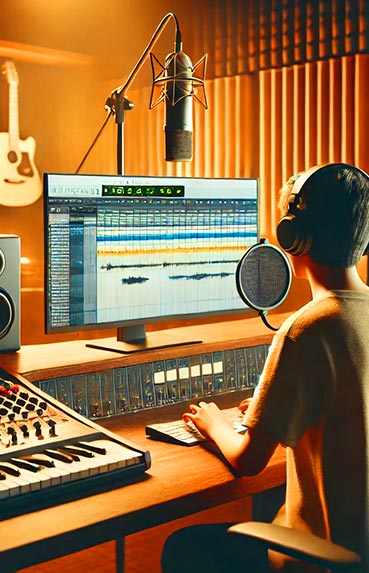Music has always been a powerful vehicle for personal expression and emotional connection. Throughout history, we have seen how technology has transformed the way music is created and consumed. In recent years, one of the most fascinating developments in this field has been the use of artificial intelligence (AI) to create personalized songs. This phenomenon is revolutionizing the music industry and offering new possibilities for both artists and listeners.
The Emergence of AI in Music
AI as a Creative Tool
Artificial intelligence has penetrated many areas of our daily lives, and music is no exception. AI is being used to compose music, generate lyrics, and even produce complex arrangements. This type of technology can analyze millions of songs to identify patterns and trends, enabling the creation of new music more quickly and efficiently.
For example, platforms like OpenAI have developed language models that can generate song lyrics based on specific styles. These models are capable of understanding context and producing coherent and meaningful texts, which is especially useful for composers seeking inspiration.
Personalization as a Trend
Personalization is a growing trend in many sectors, and music is no exception. With the help of AI, it is now possible to create personalized songs that cater to individual listeners' preferences. This level of personalization not only increases listener engagement but also offers a unique and personal experience.
A notable example is platforms like Jukedeck, which allow users to create customized music for their videos and multimedia projects. These platforms use AI algorithms to compose music tailored to each user's specific needs.
The Process of Creating Personalized Songs
Data Collection
The first step in creating a personalized song is data collection. AI platforms use information about the user's musical preferences, such as favorite genres, preferred artists, and desired mood. This information is used to generate a unique profile that will guide the song's creation.
- Musical Genre: Choosing the genre is crucial for defining the style and structure of the song.
- Reference Artists and Songs: The user's favorite songs or artists are analyzed to identify melodic and lyrical patterns.
- Mood and Theme: AI can adjust the song's tone and lyrics to reflect the desired mood.
Generation and Composition
Once the necessary data has been collected, AI uses advanced algorithms to compose the song. These algorithms can generate melodies, chords, and lyrics based on the user's preferences. The result is a unique musical piece that reflects the listener's personal characteristics and tastes.
An interesting aspect of this process is AI's ability to experiment with different combinations of musical elements, creating a variety of versions before reaching the final one.
Adjustments and Review
After the initial generation, the user has the opportunity to review and adjust the song according to their preferences. This can include changes in lyrics, melody, or instrumentation. Many platforms offer intuitive tools that allow users to make these adjustments easily and quickly.
Advantages of AI-Personalized Songs
Accessibility and Cost
One of the main advantages of AI-personalized songs is their accessibility. Traditionally, creating a personalized song required hiring composers and musicians, which could be costly and time-consuming. With AI, this process has been simplified and made more affordable, allowing more people to access personalized music.
Limitless Creativity
AI is not limited by traditional music conventions, allowing for greater experimentation and creativity. Composers can explore new styles and sounds without worrying about technical limitations. This has led to the creation of innovative and fresh music that challenges listener expectations.
Enhanced User Experience
The ability to personalize songs significantly enhances the user experience. Listeners can enjoy music that resonates with their emotions and personal experiences, increasing their emotional connection to the song. This is especially valuable in a world where personalization is increasingly valued.
Concrete Examples of Personalized Songs
Innovative Musical Projects
Some artists have started using AI to create innovative musical projects. For example, artist Taryn Southern used AI to compose her album "I AM AI," becoming one of the first artists to use this technology for a complete project. Such initiatives highlight AI's potential to transform music and offer new experiences to listeners.
Applications in the Entertainment Industry
Personalized music is also finding applications in the entertainment industry. Personalized soundtracks for video games and movies are gaining popularity, allowing creators to offer more immersive experiences. Platforms like Amper Music are leading the way in this field, offering tools that allow users to create personalized soundtracks for their projects.
Practical Tips for Creating Personalized Songs
Choosing the Right Platform
The first step in creating a personalized song is choosing the right platform. There are several options on the market, each with its own features and capabilities. It's important to research and choose a platform that fits your needs and budget.
- Jukedeck: Ideal for users looking to create music for videos and multimedia projects.
- Amper Music: Offers advanced tools for creating personalized soundtracks.
- OpenAI: An excellent option for generating song lyrics in different styles.
Experimenting with Different Styles
One of the advantages of using AI is the possibility of experimenting with different musical styles. Don't be afraid to try unusual combinations and explore new genres. Creativity and innovation are key to creating a unique and memorable song.
Getting Involved in the Process
Although AI can automate much of the music creation process, it's important for the user to be actively involved. This can include reviewing lyrics, selecting instruments, and making decisions about the song's structure. Collaboration between the user and AI can lead to surprising and satisfying results.
The Future of Personalized Songs
Technological Advances
The future of AI-personalized songs is promising, with technological advances continuing to expand possibilities. AI is expected to keep improving its ability to understand and replicate the emotional complexity of human music. This will allow for the creation of even more personalized and emotionally resonant songs.
Integration with Other Technologies
The integration of AI with other technologies, such as virtual and augmented reality, promises to offer even more immersive and personalized musical experiences. Users will be able to experience music in completely new ways, where every note and every lyric is designed specifically for them.
Ethical Implications
As AI plays an increasingly important role in music creation, ethical questions also arise. Intellectual property, copyright, and the role of the human artist are issues that need to be addressed to ensure fair and equitable use of this technology. It's crucial for the music industry and legislators to work together to establish clear and fair standards.
The impact of artificial intelligence on music is a testament to the power of technology to transform how we create and experience art. Personalized songs are just the beginning of a new era where music adapts to our lives in ways we never imagined before.

















